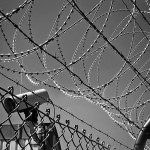
I feel that it’s time to remind my audience what a Christian is supposed to do.
As Christians, we are supposed to conform ourselves to Christ.
That’s our main job. In one way, Christ is doing that for us and we can’t control it, but in another it’s our job to cooperate. We were made in the image of God in the first place, but now God is doing us one better and making us one flesh with Christ– not just an icon but something scandalously deeper. That is the terrible message of Christianity: God became man so that man might become God. No one is supposed to understand this better than the One Holy Catholic and Apostolic Church: we actually drink and eat Christ. We take Christ into our bodies and make Him one with our physical selves as part of our worship. If that doesn’t show you that you’re supposed to become Christ, I don’t know what will.
Please don’t look to me for an example of this message in action. I, like you, am the worst of sinners. But that doesn’t mean I shouldn’t tell the truth. I am supposed to imitate Christ however I can, and to repent the thousand times a day that I fail. And so are you. That’s what we’re supposed to be doing.
So let me ask you: according to the Gospels, what did Christ do when He saw someone who needed help?
Did He blame them for the trouble they were in? Did He point out the ways they could have not gotten into that trouble in the first place?
Or did He skip that part, and help?
Christ met a Samaritan woman that He knew was guilty of some serious sins against chastity. He saw her drawing water from the well at high noon alone, which was not the custom at the time. Women went to get water in the morning and the evening, in the cool parts of the day; they saw each other at the well and chatted as they waited their turn. This woman was alone, drawing water at noon so she wouldn’t run into anybody, because she was notorious in the village and she’d earned that notoriety. What did Christ do?
He didn’t bawl her out about how she’d be able to go to the well in the morning and have friends, if only she hadn’t been a home-wrecker. He just befriended her, and talked with her. He gave her something she needed.
Christ was brought a woman who was caught in the act of adultery. There was no question as to her guilt. The Pharisees brought her to Him and made her stand there, exposed and ashamed, on her way out to be stoned to death. They reminded Christ that the Law said they got to murder such a woman because of her sin. Christ didn’t tell that woman that this was her own fault for committing adultery. He saved her life. He reminded her would-be killers about their own sins, and when they had left in shame, He told her that He did not condemn her. He said, “Go and sin no more.”
Christ was brought countless people who were sick and injured, disabled and even possessed. Surely, among that multitude, there were people who got sick or injured or tormented through their own fault. But there is no record in the Gospels of Christ telling everyone that this or that person was suffering because they’d been reckless. We are only told that He was moved with compassion, and healed them.
Christ found Himself preaching to an audience of five thousand men, not counting the women and children. Most of these people had not remembered to bring lunch. They were going to starve if they walked away without dinner. He didn’t sternly inform them that they should be more careful to plan ahead; He found a child willing to share his own food, and performed a miracle to feed them all with plenty left over.
Christ was denied three times by His closest friend, Saint Peter, and when that was done, Saint Peter didn’t stay and beg for forgiveness. He just ran away crying, embarrassed. Christ went to His death abandoned by His faithless friend. After He rose from the dead, Christ encountered Saint Peter fishing. He didn’t confront him with what a miserable coward he had been and that he deserved to be embarrassed. He told Peter where to fish, He made him breakfast, and He gave him the opportunity to say that he loved Him.
Christ found Himself crucified between two robbers. One of the robbers realized that he deserved exactly what He was getting, and begged to be remembered. And Christ did not taunt that sinful man with reminders that this was all his own fault. He said, “this day, you will be with Me in paradise.” And that terrible man is now remembered as a saint.
This is the position that you and I are in every day. All have sinned. All have fallen short. All of us have earned the fires of hell with our actions. If we were nailed to a cross to die with Jesus this evening it would serve us right. You and I, Mark Shea and Dave Armstrong, Pope Francis and Pope Emeritus Benedict, all of us. We are sinners. And every day of our lives, we ought to be asking Christ to save us, even though we don’t deserve it. And Christ does save us, because He loves us, without asking if we are worthy. He already knows we’re not. He heals us and continues to draw us into Himself, so that we may be with Him in paradise.
Nobody deserves paradise except God Himself. The rest of us, all the saints among which we hope to be counted, will get there through mercy. If we are to imitate Christ, then, we have to do likewise. We have to be merciful and help people whether or not we think they’re worthy. Yes– even if we are pretty sure that the fix they’re in is their own fault.
Lately, I keep seeing public Catholics spending alarming amounts of time posting about how the economic migrant and his daughter who drowned in the Rio Grande recently were at fault. They ought to have stayed where they were, and not attempted such a treacherous crossing. I have seen people accusing the man of criminal negligence or homicide, mulling it over aloud and trying to think of the worst thing they can accuse him of doing. This is just another example of a pattern I see in many people who call themselves Catholic and write online. The same type of people will try to tell you that poor people are at fault for not budgeting their grocery money properly. And they portray this as somehow a Catholic viewpoint. They even call it Catholic Apologetics.
To me, that’s the most unbecoming thing a Catholic can do. It flies in the face of everything we profess. It’s a blasphemy that mocks our faith and our God. It’s anti-Catholic and anti-Christ. It’s an anti-apologetic for our faith.
We’re all at fault.
The important thing is to look upon a person in trouble, be moved with compassion as Christ was, and do as Christ did. Heal. Rescue. Speak out on behalf of the helpless.
Pray for that poor man and for everyone like him. Pray for the family he left behind. Pour out your compassion on poor people and refugees, sick people and prisoners, and everyone else you encounter. I’ll tell you in advance: they’re all guilty of some terrible sin or other. Every last one of them. And so are you and I. Do for them what you’d like to have done to you.
This is the Law and the Prophets.
This is, in large part, what it is to be Christian.
If anyone brings you another gospel, let that one be anathema.
(image via Pixabay)













